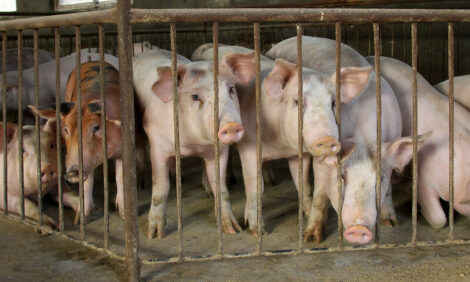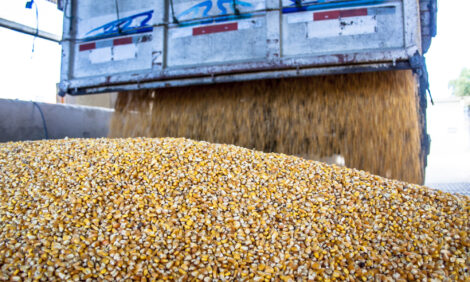



Pork Commentary: Pork Industry Conference Report
US - This week, Jim Long reports on the National Pork Industry Conference.Last week, Jim Long attended the National Pork Industry Conference (NPIC), which was held at the Kalhari Resort, Wisconsin Dells, Wisconsin. Genesus was a sponsor, here are his observations:
- This year, NPIC set a new attendance record in its multi–year history. The Wisconsin Dells locale is family friendly, inundated by water parks and other tourist attractions. Many conference attendees brought their families making it a vacation opportunity.
- Larry Grahamn and Glen Shields manage the conference, they delivered what was in our opinion a much stronger group of speakers and subjects compared to the previous year. The conference was professionally managed, kept on time with appropriate breaks for participants to informally dialogue.
- Much of the informal dialogue centred on feed (corn) costs and crop conditions. It's the number one obsession of our industry. Pick an opinion on corn prices, they are all out there. Bottom line: Corn price will be either up or down. It's a crap shoot!
- Donnie Smith, CEO of Tyson Foods, was a speaker. Listening to him talk, it was not hard to figure out why he is CEO of a huge food company. The combination of intelligence and personality was evident. Mr Smith gave a clear synopsis of US pork competitiveness edge
- most efficient grain producer
- transportation infrastructure
- efficient pork production and currency exchange rate edge
- nutrition, and
- risk management tools
- On the same panel as Donnie Smith was Clint Lewis CEO of Pfizer Animal Health USA. Mr Lewis was an excellent speaker; his main topic was Pfizer's Improvac (USA – Improvest) vaccine. It is the first time that we can recollect a main conference speaker topic was an info-mercial for their company and products. More than one attendee expressed the sentiment that they paid around $500 registration to attend the conference and were bombarded by a commercial. Mr Lewis has a future on the Home Shopping Network if he ever desired.
- Mr Lewis explained Improvest will be a safe and effective way to eliminate boar taint. Approved currently in 59 countries but the world is waiting to see if USA will use it. It is available by veterinarian prescription only (follow the money trail). It would lower greenhouse gases.
- In the question session, two large producers asked why anyone would use such a product. What is the upside compared to the consumer and export market danger?
- At the conference, a major pork organisation told us their surveys of consumers tell them there could be major resistance for Improvest at the household level. Housewives do not want to be exposed to what they perceive is hormones. We were told by the same group to stay on our message. Politically they cannot go against Impovest because it is a legal product but they encouraged us to keep getting the truth out there. Many can be intimidated by billion dollar drug companies and their pressure to stop a message. Pfizer has many millions of dollars invested in the Improvest programme. Failure for a successful launch at the same time they have put the Animal Health Division up for sale could extremely discount its brand and value. You could sense the pressure on Mr Lewis in his talk: they bet the farm, probably a big mistake. It appears to us the industry will not take the risk to our domestic and export pork demand.
- We talked at the conference to Danish and Dutch attendees. Although Improvest is approved in both countries, neither country's producers are using it. Instead, in those countries, producers have stopped castrating altogether getting the $8-$12 per head advantage from better growth, feed conversion and lean growth without the cost of $4.00 per head or more for Pfizer products. This has allayed Animal Welfare fears while giving greater returns to producers. Carcasses are tested for boar taint. Any found go into processing. Would that work here? It could be an option where we give Animal Welfare a bone and improve producer and packer returns. Pork consumption per capita in Western Europe is double USA. Obviously the above programme is not hurting demand.
- Jerry Steiner, Executive Vice President from Monsanto, spoke:
- one billion in the world are hungry
- one billion in the world are overweight
- need to double food production globally by 2040.
- In the last 20 years, there has been a 28 per cent more crop produced – accomplished by two to three per cent more farm land, 19 per cent higher yield and seven per cent more harvested land.
- One of the keys going forward will be to increase yields toward US levels in places like Africa, Mexico and Eastern Europe from more intensive crop production. This could increase the world's grain production 60 per cent.
- With ever scarcer grain resources the efficiency of hogs versus cattle will come in to play. It takes 30 calories to produce one calorie of beef, while 7.5 calories will produce one calorie of pork.
- The bottom line: new technologies will be needed and adapted to improve food production – technologies that can be accepted by consumers.
Summary
This was a great conference, good speakers, and a great value to attend. There is a lot going on in our industry. These are exciting times but not for the faint-hearted.








